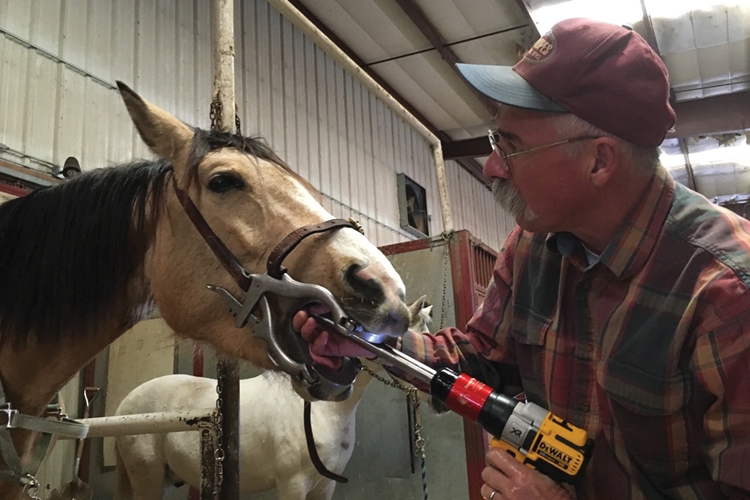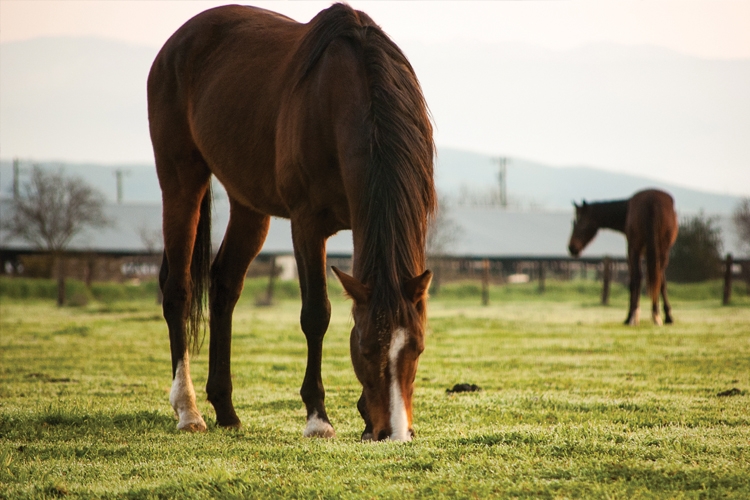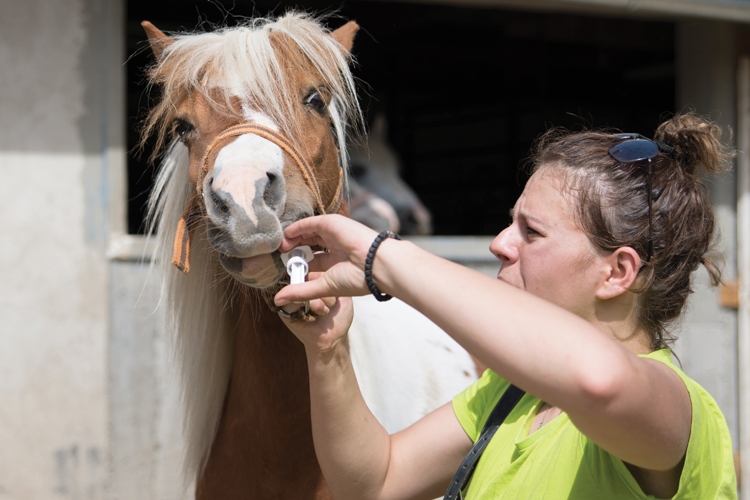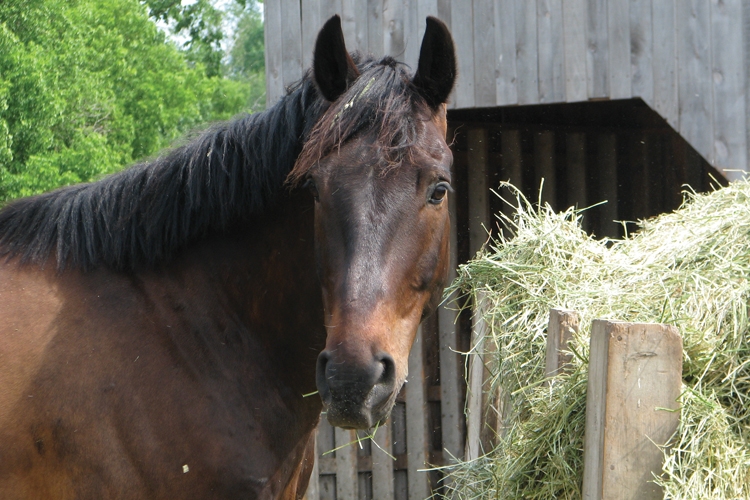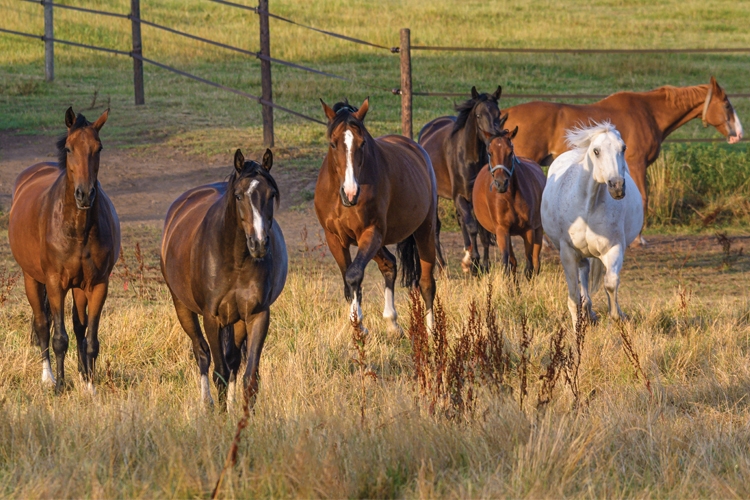
Recurring Colic
There’s a lot of trepidation when a horse owner peers over the stall door or into a horse’s paddock only to see him lying on the ground listlessly in obvious distress or seeing him rolling on the ground in pain. One of the more dreaded health problems faced by horse owners and trainers is colic. While many colic episodes are relatively minor and resolve quickly with or sometimes without veterinary intervention, it is possible for equine colic to develop into a more serious crisis that requires surgery or could even be fatal.
Once the crisis is past, you might feel like you can breathe a sigh of relief, but some individuals recover from an initial bout of colic only to later experience repeat episodes. It is reported that 15% of horses are likely to have a repeat colic episode, with some developing 2-4 incidences a year.
A British study examined risk factors for recurrent colic in 59 cases and compared them to 177 control horses that did not experience colic. A repeat colic episode is one that recurs anytime from 48 hours to one year following the original onset. The study identified several correlations and uncovered other potential links that are worthy of further examination.
The most understandable link was a positive correlation with pasture turnout: Horses with daily pasture access had a greatly reduced incidence of recurrent colic. This is not surprising since equine intestinal health is promoted by eating habits that favor small amounts consumed regularly and intermittently throughout day and night such as a horse often achieves on pasture. A horse with the ability to supply frequent small amounts of forage to the stomach and intestinal tract is a horse that is following the dictates of his normal evolutionary predilection as a “trickle feeder.” A high forage diet is important to equine digestive health – forage comes in the form of hay or pasture, and in part in complete feed pellets. If pasture isn’t available, then offering free choice hay promotes intestinal health and helps to forestall anxiety.
In addition to the forage obtained from pasture, horses are often turned out in a group of horses, which provides them with the necessary social interactions and playtime that are important behavioral expressions of herd animals. It is likely that this freedom of turnout reduces stress while at the same time satisfying specific behavioral and psychological requirements.
One notable study finding was that stereotypies (repetitive vices) such as crib-biting or weaving have a high association with repeat colic. In a previous study, horses with dental problems also seem more prone to recurrent colic. The good news is that horses with repetitive stereotypic behaviors turned out to pasture benefit by a reduction in recurrent colic events. As for dental work – this is easily remedied with once or twice-yearly veterinary visits to perform dental work that improves chewing and digestion of food.
One caveat is that any time diet is altered, a horse should be given 2-3 weeks of slow adjustments until his digestive tract accommodates the changes. A logical strategy is to spend a few weeks slowly acclimating a horse to steadily increasing periods of time on green grass until he can be on pasture for 6-12 continuous hours, or whatever is appropriate for your situation. For horses that have physiologic issues like equine metabolic syndrome or Cushing’s disease, pasture may not be a possible option, or at the very least, the horse should wear a grazing muzzle during turnout.
Other possible links were found in this study: Horses fed probiotics seem to have a higher incidence of recurrent colic, the reason for this unspecified. Horses with stereotypic behaviors that were fed apples or carrots seemed to have a reduced incidence. The researchers cautioned that both these issues need further investigation before drawing conclusions.
Previous research has also identified intestinal parasitism as a cause of recurrent colic, and so deworming strategies continue to be important to intestinal health. It is best to have your veterinarian run a fecal egg count once or twice a year to tailor an individual parasite control program for each horse. Horses stabled in stalls or paddocks that are mucked out daily are least at risk for ingestion of infective parasitic larvae. Those on pasture are at highest risk, particularly if out with other horses. In addition, it is also known that horses need access to clean, unfrozen water as well as quality forage in order to keep their intestinal tract working in tip-top shape.
Horses that have had abdominal surgery are more prone to a repeat colic episode, often due to adhesions (scar tissue) in the bowel following abdominal exploration and intestinal manipulation. Chronic NSAIDs (non-steroidal anti-inflammatory drugs) like phenylbutazone or flunixin meglumine are known to induce stomach and/or colonic ulcers, which contribute to colic. NSAIDs also contribute to increased intestinal permeability that can create “leaky gut syndrome” and systemic inflammation. Another cause of chronic colic is persistent ingestion of “sand” when hay is fed on the ground or dirt is consumed in over-grazed pastures. And, of particular significance is the fact that high-grain diets are fermentable and can lead to painful gas colic, which could progress to a more serious colon displacement.
Good management strategies can help keep colic episodes to a minimum. These include:
• Strategic deworming protocols in collaboration with your veterinarian and based on fecal egg counts
• Dietary management that maximizes high quality forage and minimizes grains
• Providing feeder systems that protect against sand and dirt ingestion
• Maximizing lifestyles to which horses evolved – freedom of movement, plenty of exercise, and herd interaction when possible
These tactics are key to successful management of every horse, and in particular those with recurrent colic.

